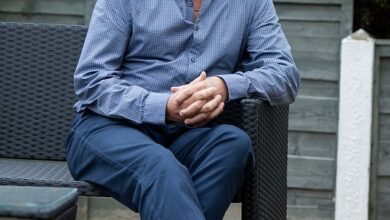DR. ELLIE: When sweating could be a sign of cancer



I am an 80 year old man and I am starting to experience hot flashes.
These happen seemingly at random. It’s so bad that my face gets covered in sweat and my shirt sticks to my back. I had blood tests, but nothing abnormal showed up. What could be the problem?
Dr. Ellie Cannon replies: Sweating or flushing should always be examined by a doctor. Menopausal women are expected to experience hot flashes – due to a drop in the female hormone estrogen – but for anyone this can be a worrying sign.

Excessive sweating can also be a sign of thyroid disease
A possible cause is the skin condition rosacea. This can cause an intense feeling of heat and redness, usually in the face, but can also cause sweating.
Some people also sweat in response to certain foods, as well as alcohol and caffeine. Anyone who begins to experience this symptom may want to keep a food diary to see if a particular item is causing the sweating.
Excessive sweating can also be a sign of thyroid disease – a problem in the butterfly-shaped gland in the neck that helps regulate the body’s metabolism.
Other symptoms may include fatigue, weight gain, depression and muscle pain.
In rare cases, sweating can be a sign of cancer. Certain blood cancers are associated with the symptom and are more common in people over 80 years of age. A GP can arrange blood tests to look for signs of cancer and can also discuss the other possible causes of the uncomfortable problem.
I am a woman in my late seventies and lately my bowel movements have changed. I now have to poop every time I pee and I also get some discharge. A colonoscopy shows I have a mild form of diverticulitis, but I have been given no advice on what to do. What would you recommend?
Dr. Ellie answers: First, anyone who experiences a change in bowel habits should consult a doctor.
This is because it can be a sign of colorectal cancer. Normally a GP will carry out a stool test to investigate this. However, one of the most common causes is diverticulosis, a condition in which small pouches develop in the lining of the intestine. This can trap some of the waste in the intestines, which can lead to inflammation and even infection.
It usually occurs in old age and is associated with a low-fiber diet. Symptoms also often include stomach pain, constipation, diarrhea, bloody poop, and bloating.
Mucus secretion – also called discharge – is another symptom, but is usually a sign that the condition is serious and not mild.
Anyone experiencing this symptom should see their doctor, even if he or she has recently been diagnosed, as it could indicate that the intestines have become inflamed, which would require medical treatment.
However, one of the most important measures patients with diverticulosis can take is to increase the amount of fiber in their diet.
This makes the waste softer and thicker, making it less likely to get stuck in the bags. Foods rich in fiber include legumes, whole wheat bread, brown rice, whole wheat pasta, potatoes with skin, as well as vegetables and fruit.
GPs may also prescribe laxatives to help with constipation and diarrhea, as well as painkillers for stomach cramps.
I recently returned from a seven-week cruise and have since experienced a feeling of rocking – it’s as if I’m still at sea. I’ve read it’s called disembarkation syndrome, but apparently most people only have it for a week at most. How can I make it stop?
Dr. Ellie answers: Disembarkation syndrome is a rare problem that is usually associated with a long stay on a ship.
People experience the sensation of rocking or swaying even when standing still.
It can cause patients to feel off balance and even cause falls or accidents.
It is thought to be caused by changes in the inner ear, which helps balance the body.
When people spend extended periods of time on a boat, the inner ear sends signals to the brain to help the body adapt to the irregular movements. After returning to dry land, the inner ear must adapt again.
However, in a small number of people this does not happen, meaning the body still believes the ground is constantly moving.
Disembarkation syndrome is more common in women and people who suffer from migraines.
For most complaints it should disappear within a few weeks, but it can also last up to a year. Unfortunately, there is no proven treatment for it and motion sickness tablets do not work.
There are indications that antidepressants, which a doctor can prescribe, can help.
There are also special exercises called vestibular rehabilitation that can help retrain the inner ear.
These can be given by a physiotherapist who specializes in the treatment of neurological or balance problems.
Diet and exercise are better than fat sticks

In the US there are huge billboards for private companies selling fat loss shots
Last week I visited family in the US and I was shocked at how widespread the use of weight loss drugs is there.
Revolutionary injections such as Wegovy and Mounjaro help patients lose up to 15 percent of their body weight.
However, I have long been skeptical that these drugs are a miracle cure for obesity. Patients must continue to take the expensive injections to maintain their weight.
Good nutrition and exercise are a much more sustainable solution.
Wherever you go in the US, there are now huge billboards for private companies selling the shots over the Internet.
There’s even a TV advert for the jab that’s so widespread that all my relatives can recite the jingle by heart.
That’s not surprising, since research shows that one in eight adults has tried one of these shots.
But despite this, the majority of Americans still eat huge portions for each meal, regularly drink sugar-laden sodas, and consume far too much red meat.
There is an important lesson here for Britain. Yes, the NHS should be offering these drugs, but it is crucial that the government takes other steps to tackle obesity in addition to this approach, such as taxing fast food and ensuring children all take part in school sports.
It’s never too late for therapy
Have you ever considered therapy? For many people, especially those later in life, talking to a stranger about your problems can be a rather unpleasant thought.
However, I was struck by a recent conversation I had with an older patient who was undergoing talk therapy.
The man had ended up in the hospital with a serious illness and for a while it looked like he might not make it.
While recovering from a long spell in intensive care, he was told that therapy could help him overcome the traumatic experience.
He had never considered it as an option and doubted it would be useful. But he told me it changed his life.
Not only did it help alleviate the mental trauma of his illness, it also helped him come to terms with the depression and anxiety he had been secretly dealing with for decades.
I wondered whether many general practitioners wrongly believe that there is no point in advising elderly people to participate in therapy.
Have you had therapy at an older age? Did it help? Write and let me know.
Do you have a question for Dr. Ellie Cannon? Email DrEllie@mailonsunday.co.uk
Dr. Cannon cannot enter into personal correspondence and her responses must be placed in a general context.




